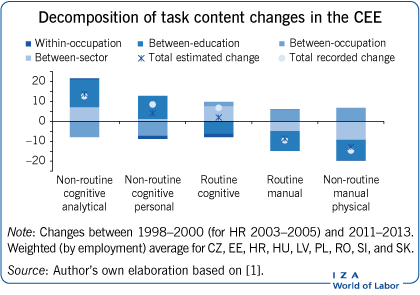Elevator pitch
Job polarization can pose serious problems for emerging economies that rely on worker reallocation from low-skilled to middle-skilled jobs to converge toward advanced economies. Evidence from Central and Eastern European (CEE) countries shows that structural change and education expansion can prevent polarization, as they enable a shift from manual to cognitive work and prevent the “hollowing out” of middle-skilled jobs. However, in CEE countries they have also led to a high routine cognitive content of jobs, which makes such jobs susceptible to automation and computerization in the future.
Key findings
Pros
Analyzing the task content of jobs allows a better understanding of occupational changes.
In CEE, structural and educational changes align well with respect to occupational change.
Aggregate restructuring triggered a shift from manual to cognitive jobs.
Tertiary education expansion fueled the growth of non-routine cognitive work.
The shift to jobs requiring higher skills dominated over the decline of middle-skilled manual jobs and prevented job polarization.
Cons
The decline of manual work left some workers vulnerable to unemployment.
The routine cognitive content of jobs increased in CEE, contrary to the most advanced economies.
As the number of graduates rose, the routine cognitive component of their jobs also increased.
Routine cognitive jobs are vulnerable to routine-biased technological change.
Country-specific surveys are needed to further study the task contents of particular occupations around the world.
